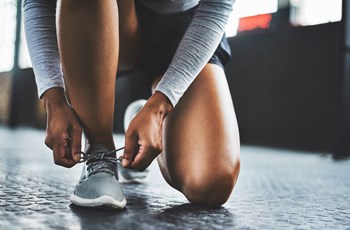How Your Hormones Affect Athletic Performance and Why You Need to Start Testing
Growing up, I never thought of myself as a runner, or really a good athlete in general. I played every sport possible as a kid, but I was never great and didn’t play high school sports. As an adult, I started playing team sports again and eventually was convinced to run a 5k. I ended up running the Warrior Dash and enjoyed it, so I continued doing 3.2-mile training runs. For the rest of my 20s I continued running 5k races with friends and played volleyball, softball, and some casual intramural sports, but was there more to my athletic prospects?
Going the Extra Mile
In 2015, my wife came up with the crazy idea of running the Chicago Triathlon. Running was fun and all, but the prospect of doing multiple sports in one race really appealed to me. We trained together, swimming in Lake Michigan and running and biking on the lakefront trail. In June of 2016 I completed my first sprint distance triathlon and I instantly wanted to do it again! However, as life happens, triathlons got put on hold. After our first child was born, my wife promptly set a goal to complete another triathlon before she was a year post-partum and did 2 sprint triathlons in 2018. My next goal was an Olympic distance triathlon, which I completed in 3:12:58. Two weeks later I did another Olympic tri and my worst nightmare came true as I got a flat tire on my bike 0.25 miles in. I managed to change the tire on the side of the road, but it set the tone for a rough day.
Since starting at ZRT I started tracking my hormones and studying how they change and affect my training and performance. Having another tool in my training toolbox has improved my performance by being able to optimize my workload and recovery balance. Never in my life did I think I would enjoy running, let alone be as much of an athlete as I am. I am currently training for a half-marathon between triathlon seasons and have used the data from my hormone tracking to get my times down to under 8 minutes per mile.
Laboratory Medicine and Athletics – Which Hormones are Involved?
It has been established that healthy athletes have adaptations to their hormonal conditioning.
Laboratory medicine in sport is an important preventative and protective science, fundamental for evaluating the condition of an athlete. The balance between workload and recovery is important for athletes to prevent injury while maintaining the highest level of competition. This balance can be monitored and optimized using laboratory medicine, particularly through the prevention of overtraining. It has been established that healthy athletes have adaptations to their hormonal conditioning [1].
Thyroid hormones regulate energy metabolism and can influence energy processes during physical exercise [2]. Thyroid hormones are also important regulators of cardiac function, protein synthesis, and calcium homeostasis. Hypothyroidism causes a decrease in athletic performance and capacity while hyperthyroidism can also cause a decrease in athletic performance through weight loss and tachycardia [2]. Analysis of thyroid hormone levels can help prevent issues and allow an athlete to reach optimal athletic performance.
Steroid hormones endogenously produced by the body are important in maintaining energy stores, building muscle, increasing oxygen capacity, decreasing fatigue and recovery time, and optimizing hand-eye coordination. The main hormone responsible for these effects is testosterone, the main sex hormone in males. Testosterone is found in both men and women. Progesterone, estradiol, and cortisol are also important hormones regarding athletic performance and must be balanced along with testosterone. Progesterone helps maintain proper activity of the thyroid, which can help increase energy availability and helps keep inflammation in check. Estradiol is the main sex hormone in women, but also important in men as well and is responsible for controlling inflammation, reducing muscle damage, and helping break down fat for fuel. Cortisol and aldosterone help in regulating metabolism, blood sugar, and water/salt balance. Excess cortisol can cause muscle breakdown and fatigue.
Now that you know about the hormones that affect you while exercising, how can you use this information to increase athletic performance? There are many ways to monitor these hormones that will give insight into whether you have the correct diet, are overtraining, or possibly have other health issues.
Hormones and Overtraining Syndrome
Overtraining syndrome (OTS) happens when the balance between training and recovery get out of sync. This is a result of the body not being able to return to homeostasis after physical exercise. Recovery is just a short way of saying the regenerative process of re-establishing homeostasis. If exercise continues before recovery completes, an accumulation of fatigue occurs. At early stages of OTS, often called overreaching, only fatigue and decreased performance present themselves, which can be overcome with a longer recovery period. If OTS continues, more long-term problems occur that change the physiology of the body and can take months to overcome [3]. Gonadal and adrenal steroids have been used as biomarkers of overtraining in athletes and can be used to assess whether an athlete is in early or late stage OTS [4].



Admin
Lorem ipsum dolor sit amet, consectetur adipiscing elit, sed do eiusmod tempor incididunt ut labore et dolore magna aliqua.
admin
Ut enim ad minim veniam, quis nostrud exercitation ullamco laboris nisi ut aliquip ex ea commodo consequat.